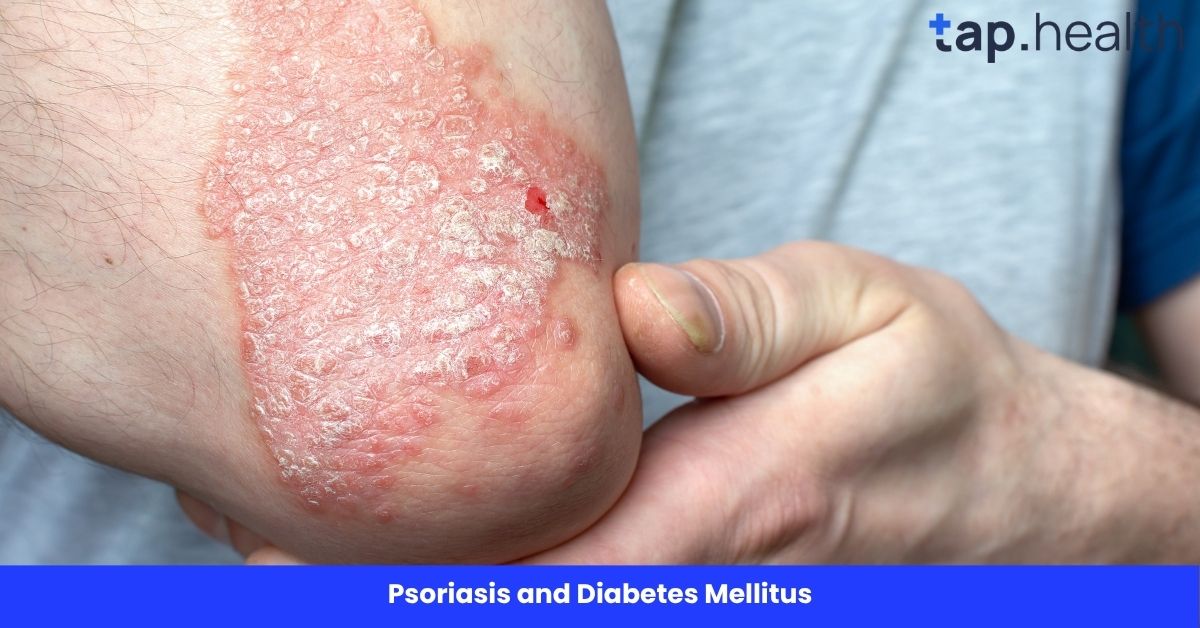Dealing with scalp psoriasis and diabetes at the same time can be overwhelming. Both conditions come with their own challenges, but when combined, they can make managing your health even more complex. Understanding how these conditions are related, their impact on the scalp, and how to effectively treat and manage both is essential for your well-being.
In this article, we will explore what scalp psoriasis is, how it relates to diabetes, common symptoms, treatment options, and how you can manage both conditions to improve your quality of life.
What is Scalp Psoriasis?
Scalp psoriasis is a common form of psoriasis that affects the scalp. Psoriasis is a chronic autoimmune condition that accelerates skin cell turnover, causing cells to build up and form thick, scaly patches on the skin. When it occurs on the scalp, it can cause itching, flaking, and redness, often leading to discomfort and embarrassment.
Symptoms of Scalp Psoriasis
The symptoms of scalp psoriasis can vary in severity. Common signs include:
- Red patches of skin on the scalp.
- Thick, silvery-white scales or flakes.
- Itching or burning sensation.
- Dry, cracked skin that may bleed.
- Hair loss (in severe cases).
Types of Scalp Psoriasis
Scalp psoriasis can present in different forms:
- Plaque Psoriasis: The most common type, characterized by raised, red patches covered with silvery scales.
- Guttate Psoriasis: Small, drop-shaped lesions that may also affect the scalp.
- Inverse Psoriasis: Red, shiny lesions that may appear in skin folds, including the scalp.
- Pustular Psoriasis: Rare, but may affect the scalp and cause pustules surrounded by red skin.
What is Diabetes?
Diabetes is a condition that affects how your body processes blood sugar (glucose). There are two main types: Type 1 and Type 2 diabetes. Both types can lead to high blood sugar levels, which can damage organs and tissues over time if not properly managed.
Symptoms of Diabetes
Common symptoms of diabetes include:
- Increased thirst and frequent urination.
- Unexplained weight loss.
- Extreme hunger.
- Fatigue or tiredness.
- Blurry vision.
How Diabetes Affects the Body
In people with diabetes, the body either doesn’t produce enough insulin (in Type 1) or doesn’t respond to insulin properly (in Type 2). This leads to high blood sugar levels, which can cause a range of complications, including issues with circulation, nerve damage (neuropathy), and delayed wound healing.
How Scalp Psoriasis and Diabetes Are Related
While scalp psoriasis and diabetes are separate conditions, they share some common factors and can influence each other. Understanding their connection is essential for managing both conditions effectively.
Shared Genetic and Environmental Factors
Both conditions have genetic components. For example, certain genetic markers may predispose individuals to both autoimmune conditions (like psoriasis) and metabolic conditions (like diabetes). Environmental triggers such as stress, infections, or even diet may also worsen both conditions.
Immune System and Inflammation
Scalp psoriasis is an autoimmune condition where the immune system mistakenly attacks healthy skin cells, leading to the rapid growth of skin cells. Diabetes, particularly Type 2, is also linked to chronic inflammation and immune system dysfunction. This means that if you have one condition, you may be at an increased risk of developing the other.
Diabetes and Psoriasis: The Impact on the Skin
Diabetes can worsen the effects of psoriasis on the skin. High blood sugar levels can lead to poor circulation, which may prevent the skin from healing properly, especially during flare-ups of psoriasis. Additionally, diabetes can cause nerve damage (neuropathy), which means you might not feel the discomfort or irritation caused by psoriasis on the scalp, leading to delayed treatment and worsening symptoms.
How to Manage Scalp Psoriasis When You Have Diabetes
Managing both scalp psoriasis and diabetes requires a multi-faceted approach. It’s important to work with your healthcare team to create a plan that addresses both conditions. Here are some tips to help manage scalp psoriasis while controlling diabetes:
1. Keep Blood Sugar Levels Under Control
The first step in managing both conditions is to keep your blood sugar levels stable. High blood sugar can worsen psoriasis flare-ups and slow down healing. Regular monitoring of your blood glucose, following a balanced diet, and taking your medication as prescribed are crucial for diabetes management.
Tips to Manage Blood Sugar:
- Eat a healthy, well-balanced diet with low glycemic foods.
- Exercise regularly to improve insulin sensitivity.
- Monitor your blood sugar levels regularly.
- Take diabetes medications or insulin as prescribed by your doctor.
2. Follow a Scalp Care Routine
Proper scalp care is vital to managing psoriasis and minimizing flare-ups. Keeping your scalp clean and moisturized can help reduce irritation and flaking. Here are some steps to help manage scalp psoriasis:
Tips for Scalp Care:
- Shampoo Regularly: Use a gentle, anti-psoriasis shampoo to reduce flakes and soothe the scalp. Look for products with salicylic acid or coal tar, which can help break down the scales.
- Moisturize Your Scalp: Apply a moisturizing treatment to the scalp to prevent dryness and irritation. Choose products that are gentle and free from alcohol, which can dry out the skin.
- Avoid Scratching: Scratching the scalp can worsen psoriasis and increase the risk of infection. If itching is a problem, try using a soothing anti-itch lotion or treatment.
3. Manage Stress Effectively
Stress is a known trigger for both psoriasis and diabetes. Learning to manage stress is crucial for keeping both conditions under control. Consider adding stress-relief techniques such as deep breathing exercises, meditation, or yoga into your daily routine.
4. Treat Scalp Psoriasis with Topical Medications
Topical treatments are commonly used to manage scalp psoriasis. These treatments can help reduce inflammation, slow down skin cell turnover, and relieve symptoms like itching and redness. Be sure to consult your doctor before starting any new treatment, especially if you have diabetes.
Topical Treatments:
- Corticosteroid Creams or Ointments: These can reduce inflammation and redness in the affected areas.
- Vitamin D Analogues: These treatments can slow down skin cell turnover and are often used in combination with other psoriasis medications.
- Coal Tar Shampoos or Topicals: Coal tar can help reduce scaling and inflammation on the scalp.
- Topical Retinoids: These are sometimes prescribed for severe psoriasis cases to slow down skin cell turnover.
5. Regular Check-Ups with Your Healthcare Providers
When managing both psoriasis and diabetes, it’s important to have regular check-ups with both your dermatologist and endocrinologist. Your dermatologist can monitor the severity of your scalp psoriasis, while your endocrinologist can help you manage your diabetes effectively. Coordinating care between the two specialists ensures that both conditions are managed properly.
Lifestyle Tips for Managing Both Scalp Psoriasis and Diabetes
In addition to medical treatment, lifestyle changes can play a significant role in managing both scalp psoriasis and diabetes.
1. Eat a Healthy Diet
A balanced diet is essential for managing both diabetes and psoriasis. Focus on a diet that:
- Reduces inflammation (eat plenty of fruits, vegetables, and omega-3 fatty acids).
- Controls blood sugar levels (eat foods with a low glycemic index, such as whole grains, legumes, and vegetables).
- Supports skin health (include vitamins and minerals like Vitamin E and zinc).
2. Stay Active
Regular physical activity is crucial for controlling blood sugar levels and reducing inflammation, which can benefit both psoriasis and diabetes. Aim for at least 30 minutes of moderate exercise most days of the week.
3. Get Enough Sleep
Lack of sleep can increase stress levels and negatively affect both psoriasis and diabetes. Aim for 7-9 hours of sleep each night to help manage both conditions effectively.
Real-Life Scenario
Consider a person with scalp psoriasis who notices persistent itching and flaking. At the same time, they have elevated blood sugar levels during routine testing. The chronic inflammation from psoriasis may contribute to insulin resistance, increasing the risk of developing diabetes. Proper care, including topical treatments and regular blood sugar monitoring, can help manage both conditions effectively.
Expert Contribution
Dermatologists and endocrinologists explain that psoriasis is not just a skin condition—it’s an inflammatory disease that can affect the whole body. Chronic inflammation increases the risk of insulin resistance, a precursor to type 2 diabetes. Experts recommend that patients with psoriasis get regular blood sugar checks, maintain a healthy weight, and follow treatment plans to reduce inflammation.
Recommendations Grounded in Proven Research and Facts
- Monitor blood sugar regularly: Early detection of diabetes can prevent complications.
- Manage inflammation: Use prescribed topical treatments and medications to control psoriasis flare-ups.
- Healthy lifestyle: Balanced diet, regular exercise, and stress management help manage both conditions.
- Avoid triggers: Smoking, alcohol, and high-sugar diets can worsen psoriasis and increase diabetes risk.
- Consult healthcare providers: Coordinated care between dermatologists and endocrinologists ensures effective management.
How Tap Health Supports Diabetics
Tap Health is a smart, AI-powered app designed to help people with diabetes in India manage their health more effectively. It offers tools to monitor blood sugar, track carbohydrate intake, and stay on top of overall wellness in one convenient platform.
Why Tap Health Makes Diabetes Management Easier
Managing diabetes can be challenging, but Tap Health simplifies the process with practical features and personalized guidance:
Precise Carbohydrate Tracking – Quickly log your meals or take a picture, and the app provides accurate estimates of carbs, calories, and portions, including popular Indian foods.
Glucose Monitoring Made Simple – Record your blood sugar readings and easily see patterns to understand how diet and lifestyle affect your levels.
Automated Reminders – Receive notifications for medications, meals, and glucose checks to ensure you stay consistent without stress.
Personalized Recommendations – The app analyzes your data to provide tailored suggestions for diet, activity, and blood sugar management.
Indian-Focused Meal Guidance – Access a wide range of Indian recipes, regional dishes, and meal plans suited to your culture and preferences.
Progress Tracking and Reports – View trends in your glucose levels and HbA1c over time with clear, easy-to-read charts.
Professional Support – Connect with qualified doctors and dietitians directly through the app for advice and guidance tailored to your needs.
Frequently Asked Questions (FAQs) on Scalp Psoriasis and Diabetes
1. Can diabetes worsen scalp psoriasis?
Yes, diabetes can worsen scalp psoriasis. High blood sugar levels can lead to poor circulation and slow healing, making psoriasis flare-ups more difficult to manage.
2. Can scalp psoriasis cause hair loss in people with diabetes?
Scalp psoriasis can cause hair loss due to the inflammation and scarring it creates. If you have diabetes, poor circulation can also make it harder for the scalp to heal, potentially contributing to hair thinning or loss.
3. How can I prevent scalp psoriasis flare-ups with diabetes?
To prevent flare-ups, control your blood sugar levels, follow a regular scalp care routine, manage stress, and use topical treatments as prescribed by your doctor. Regularly monitor both your psoriasis and diabetes to stay on top of any changes.
4. Are there special shampoos for scalp psoriasis in people with diabetes?
Yes, shampoos containing coal tar, salicylic acid, or ketoconazole are commonly used to treat scalp psoriasis. Ensure that the products you choose are gentle on your scalp and free from harsh chemicals that may irritate the skin.
5. Can I use oral medications for scalp psoriasis if I have diabetes?
Yes, oral medications such as methotrexate or biologics may be prescribed for severe scalp psoriasis. Be sure to consult your doctor, as some medications may interact with diabetes treatments or affect blood sugar levels.
6. How can I manage both scalp psoriasis and diabetes at the same time?
Managing both conditions involves keeping your blood sugar levels in check, following a proper scalp care routine, using appropriate treatments for psoriasis, and leading a healthy lifestyle that includes a balanced diet, exercise, and stress management.
Conclusion
Managing both scalp psoriasis and diabetes requires a careful, coordinated approach. With the right treatment, lifestyle changes, and regular monitoring, you can keep both conditions under control and maintain healthy skin. Work with your healthcare providers to develop a personalized treatment plan, and remember that proper care and attention to both your scalp and diabetes will help you feel your best.



